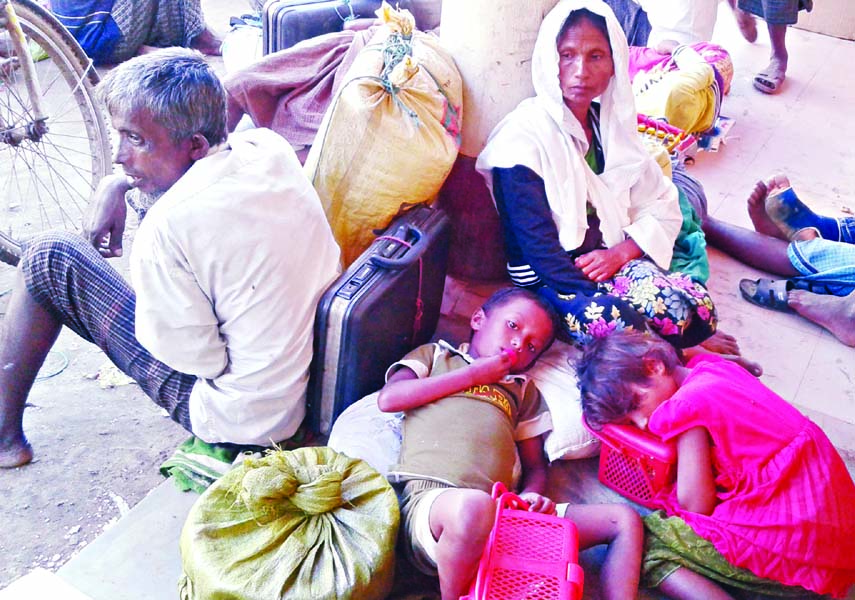
News Desk :
The Myanmar government has set four preconditions for the repatriation of over one million Rohingyas who have fled across the border to Bangladesh to escape persecution.
A report ran by Kolkata-based Bengali newspaper Anandabazar Patrika on Saturday said the matter of the refugees was discussed during an international conference on India-Myanmar relations in Yangon on Friday.
The Calcutta-based Institute of Social and Cultural Studies (ISCS) organized the high profile two-day conference on “India-Myanmar Relations – The Way forward”. ISCS’s Secretary Arindam Mukherjee, organised the conference on 10-11 November at Pan-Pacific Hotel in Yangoon.
According to the Indian daily, the conditions set forward by Ministry of Foreign Affairs Secretary U Kyaw Zeya are hard. Those Rohingyas who can provide documented proof of long-term residence in Myanmar, want to return to Rakhine of their own will, can prove that they have relatives on the Myanmar side of the border and (in the case of children) can provide evidence their parents are permanent residents of Myanmar will be allowed to return.
India, which shares borders with the two neighbouring countries, has said Myanmar will have to take back its nationals currently taking refuge in Bangladesh. Similar calls have come from many other countries.
It is clear that it would be difficult for most of the approximately one million Rohingya refugees to meet the conditions set by Myanmar as many fled their homes in fear for their lives and are unlikely to have proof of residence in the country.
When the question was raised at the ISCS conference, U Kyaw Zeya said that, “Of course it is mandatory to show some documents such as school registration, medical treatment at hospitals, work documents. Otherwise it is difficult to take them.”
Clarifying the ‘strict’ stance on Myanmar, U Kyaw Zeya said that the issue wasn’t simply humanitarian, but also a matter of security. “The implementation of the Kofi Annan Commission’s recommendations would show the Myanmar government’s sincerity,” he added.
Another report published in the New Light of Myanmar said the Myanmar government has begun to issue National Verification Cards (NVCs) as certificates of citizenship to Rohingyas in Maungdaw.
The NVCs are being distributed based on a survey using the 1982 citizenship law to determine which persons are defined as Myanmar nationals. The Muslim-majority Rohingya minority was not granted citizenship by Myanmar, which has long been a point of contention.
For years, the Myanmar government has treated the minority as ‘illegal Bengali immigrants’. The Kofi Annan Commission’s recommendations include the granting of Myanmar citizenship to the Rohingyas.
ISCS’s Secretary Arindam Mukherjee said India wants to strengthen the military-to-military relations not only to train the Tatmadaw in key areas like counter-terrorism and UN operations, but our army also wants to learn from Myanmar’s long counter insurgency operations.
Meanwhile, Dhaka on Saturday held a meeting with the non-resident envoys of 76 countries to seek cooperation for creating pressure on Myanmar to send back Rohingyas from Bangladesh. All the envoys are New Delhi based as they have no embassy in Bangladesh.
Bangladesh High Commissioner to India Syed Muazzem Ali held separate briefings with the non-resident envoys in New Delhi. “The envoys extended their full support to the Bangladesh’s position in handling the Rohingya crisis . . . they said, they to want visit the Rohingya camps to get a firsthand idea of the situation,” he told a press conference.
Muazzam Ali said the Delhi-based envoys to Bangladesh also said their countries wanted quick solution of issue that created humanitarian crisis in Bangladesh.
According to a Foreign Ministry release, he held separate briefings with the non-resident envoys and sought supports of the countries to any international move to pressurize Myanmar for secured return of the Rohingyas, who were forcibly displaced from their ancestral home in the Rakhine state creating a situation which UN described as a classic example of ethnic cleaning.
It said the media briefing came a day after the high commissioner held separate briefings with the envoys when said he said up to 612,000 Rohingyas arrived Bangladesh since Myanmar launched a brutal crackdown on the minority ethnic community on Aug. 25 until when over 400,000 Rohingyas were sheltered in Bangladesh raising the number to over one million.
The international community has expressed support and solidarity with Bangladesh in Prime Minister Sheikh Hasina’s five-point proposals she presented at the last UN General Assembly session calling for an unconditional and immediate return of the displaced Rohingyas to their homeland in Myanmar and the implementation of Kofi Anan Commission’s report.
Ali described the crisis as the most humanitarian catastrophe and was warned that the regional security and environment would be seriously endangered if the crisis was not resolved soon. Minister (Press) of Bangladesh Mission in Delhi Farid Hossain accompanied the high commissioner in the media briefing, joined also by senior journalists like Indian Press Club President Gautam Lahiri while Bangladesh’s Deputy High Commissioner to India Raqibul Haque and Deputy High Commissioner to Kolkata Towfiq Hasan were also present.

